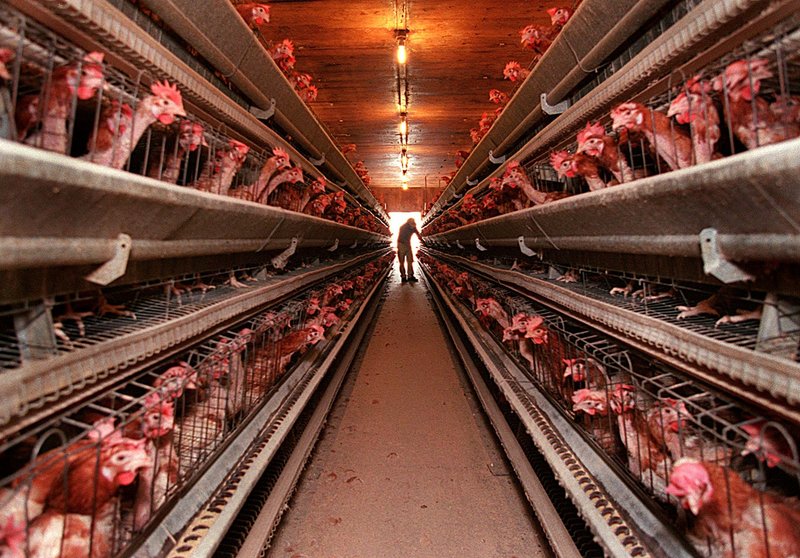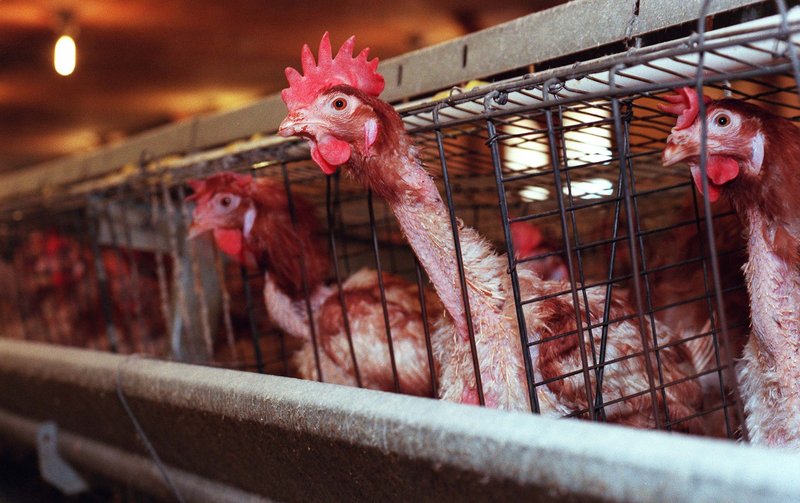Maine’s problem-plagued egg production farm is under new management.
Last month, Moark, a subsidiary of the privately owned Land O’Lakes, entered into a 10-year lease agreement to run the former DeCoster Egg Farms. At the end of the term, Moark will have an option to buy the company.
This announcement came just weeks before company founder Austin “Jack” DeCoster and his son, Peter, revealed they were exiting the egg business and relinquishing control of all operations in Maine, Iowa and Ohio.
The move by the DeCosters followed a 2010 nationwide salmonella outbreak that sickened an estimated 1,900 people and led to the recall of 550 million eggs. Investigators traced the source of the outbreak to DeCoster’s egg barns and contaminated feed operations in Iowa.
The departure of DeCoster sounds like good news to critics. Yet questions remain. Will the new management be any better? And is it possible to operate a factory-scale farm in a sustainable and humane manner?
Since its founding in 1961, the Maine egg farm has been fined and sued multiple times for its treatment of workers, animals and the environment.
Some of the farm’s more recent transgressions caused it to be slapped with a $2 million fine for unsafe working conditions, a $143,500 fine for improper disposal of chicken feces, a $3.2 million class-action lawsuit settlement related to illegal worker housing conditions, and a $125,000 penalty following an undercover video that revealed widespread animal abuses at the farm.
The farm consists of more than 80 chicken barns and related facilities spread over properties in Turner, Leeds and Winthrop. The state estimates that it houses up to 4.5 million chickens, while Moark puts the number at 3.6 million. Whatever the figure, this is not only the largest egg producing farm in Maine (the next largest is home to roughly 10,000 hens), but also the biggest in New England.
“It’s going to be business as usual” at the farm, said Daniel Hauff, who directs investigations at Chicago-based Mercy for Animals, which led the 2009 undercover investigation at the former DeCoster farm that documented extensive animal abuse. “Moark has its own history of cruelty.”
Hauff pointed to a 2005 undercover video shot at a Moark egg farm in Missouri, which showed a worker disposing of live chickens in a trash can. As a result, Moark was ordered to pay $100,000 to the Humane Society of Missouri. Similar practices at the former DeCoster Egg Farm were documented during Mercy for Animals’ undercover investigation.
According to a statement from Land O’Lakes spokesperson Jeanne Forbis, “an outside service crew inappropriately handled the hen euthanization process. Moark dismissed the service company and now only utilizes Moark employees in this process.”
One of the biggest criticisms leveled by animal welfare groups relates to both DeCoster’s and Moark’s use of “battery cages” to house hens. Battery cages typically house four to five birds in crowded wire enclosures where the chickens don’t have enough room to stretch their wings. That practice will continue under the new ownership.
“The problems you find in the egg industry and particularly the battery cage industry are the exact problems that caused the salmonella outbreak — confining animals in such small spaces in filth allows disease to thrive,” Hauff said. “If they really cared about the hens, they would get rid of the battery cages. But these companies are all about profits, and the first thing that goes is animal welfare.”
Paul Shapiro, director of the farm animal protection division at the Humane Society of the United States, said, “documented studies show that cage-free operations have lower rates of salmonella than caged operations.” Both California and the European Union have banned the use of battery cages.
In a written statement, Land O’Lakes’ Forbis said, “with regard to animal care, Moark is committed to quality animal care. We follow industry animal welfare guidelines, and will continue to do so at the Maine facilities.”
Maine State Veterinarian Dr. Don Hoenig said unlike other states, Maine requires all laying hens to be vaccinated against salmonella. Samples are taken from each barn twice a year to test for salmonella. No salmonella has been detected in any of the farm’s Maine barns in more than two years.
“I think (the new management) will make it a lot less confusing, because there were always these internal goings-on (under DeCoster’s management) we were never privy to,” Hoenig said. “We’d always be wondering who was pulling the strings from the ownership end. Now the company can speak with one voice, and that will make it less confusing for us.”
According to Forbis, Moark has hired a human resources manager and an environmental, health and safety manager for the Maine farm.
A major producer of cheese and butter, Land O’Lakes is an agricultural cooperative that produces 12 billion pounds of milk each year. The company also owns divisions that sell animal feed, pesticides and seeds, including genetically modified varieties. In 2010, the company reported profits of more than $178 million.
Dean Foods Co. has a licensing agreement with Land O’Lakes to market dairy products under the Land O’Lakes brand. Dean Foods has been criticized by consumer groups for issues ranging from alleged unsanitary living conditions of animals under its care to intentionally misleading the public when it stopped using organic soybeans in its Silk brand soy milk without alerting buyers.
“The driving force is going to be the tone set by management,” said Andrew Files, who heads the Maine Sustainable Agriculture Society. “It could be a better situation than what we’ve experienced with DeCoster in the past. Is it better than 10 layers in your backyard? That’s a different discussion.”
The idea of scale is relevant, because farms don’t get bigger to provide better treatment for animals or to grow more nutritious food. Farms get bigger to lower costs, produce cheaper food and boost profits.
“It’s extremely efficient to run a building as a factory,” said Russell Libby, who heads the Maine Organic Farmers and Gardeners Association. “You can get your costs down to almost nothing (on a per bird basis). Then you have the scale of micro, which is plenty efficient, but won’t feed everybody. In between, we need more good models.”
Critics of Land O’Lakes business practices point out that in June, the company paid $25 million to settle claims that it and other major egg producers engaged in a price-fixing scheme that involved killing off hens to inflate wholesale egg prices.
Land O’Lakes and other major dairy producers are now facing a lawsuit alleging a similar conspiracy to drive up wholesale milk prices by slaughtering more than half a million cows.
What will this mean for Maine? Forbis said not to worry.
“As employees, customers and the people of Maine get to know Moark, we believe they’ll view us as a highly responsible operator, a strong economic contributor, and a good neighbor,” Forbis said in a statement.
Only time will tell whether new management will bring change to this troubled farm.
Staff Writer Avery Yale Kamila can be contacted at 791-6297 or at akamila@pressherald.com
Twitter: AveryYaleKamila
Send questions/comments to the editors.




Success. Please wait for the page to reload. If the page does not reload within 5 seconds, please refresh the page.
Enter your email and password to access comments.
Hi, to comment on stories you must . This profile is in addition to your subscription and website login.
Already have a commenting profile? .
Invalid username/password.
Please check your email to confirm and complete your registration.
Only subscribers are eligible to post comments. Please subscribe or login first for digital access. Here’s why.
Use the form below to reset your password. When you've submitted your account email, we will send an email with a reset code.